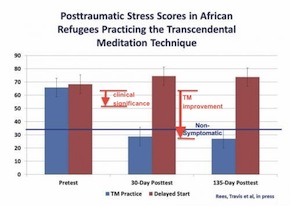A brand new research study published recently gives hope for hundreds of thousands of traumatised African refugees.
The study in the April Journal of Traumatic Stress reports dramatic and amazing reductions in post traumatic stress following instruction in Transcendental Meditation.
Refugees from the Congolese civil war, now living in Uganda were instructed in TM. A randomised matched control group waited for over four months before being taught.
The chart above compares their scores on the Post-Traumatic Stress Disorder Checklist (PCL) before instruction, 30 days later and 4 1/2 months later.
A reduction of 11 points on the test is considered clinically significant. The TM practitioners reduced almost 40 points, and their scores improved still further after 135 days
According to lead author Colonel Brian Rees: “We anticipated improvement, but I didn’t expect this magnitude of change,”
“The continued improvement at four months also led us to conclude that TM may be a very worthwhile intervention for anyone suffering from post traumatic stress.”
Both groups indicated severe PTS symptoms at baseline. The Transcendental Meditation group showed three times the clinically significant drop in PTS symptoms after 30 days practice. At his point they were “non-symptomatic”, and they and remained so at 135-days.
A large number of veterans returning from wars suffer post traumatic stress (PTS), now recognized as a serious health problem. It would be an act of mercy to have the findings of this study become common knowledge.
The participants were matched on age, gender and severity of post traumatic stress symptoms at baseline. All participants were given the Post-Traumatic Stress Disorder Checklist (PCL) at baseline, and 30-day and 135-day after learning TM. PCL scores in the control group trended upward from baseline to the two post tests. In contrast, PCL scores in the TM group went from high at baseline, indicating severe PTS symptoms, to a non-symptomatic level after 30-days TM practice, and remained low at 135-days.
“I was surprised to see how quickly TM practice had an effect on post traumatic stress symptoms in these refugees, who had no home, no job, and very little support from their environment,” said co-author Fred Travis, Ph.D., Director for the Center for Brain, Consciousness, and Cognition at Maharishi University of Management.
“…TM may be an effective antidote to the rising incidence of PTS in the world.” said Dr Travis.
Post traumatic stress sufferers may be hyper-vigilant, sleep badly, be distrustful, and have memory problems. They find it difficult to make decisions and have poor following through. Apparently, posttraumatic stress symptoms are resistant to change by usual therapy.
I find this very poignant information as I have reason to believe my father was a sufferer. And he did not survive.
Transcendental Meditation gives a state of restful alertness which appears to reverse the damage done by traumatic experiences.
This research showing reductions in post traumatic stress in African refugees replicates findings in previous research with Vietnam veterans and Iraqi/Afghanistan veterans.
Dr Travis said that TM practice was more effective than psychotherapy in reducing anxiety, depression, insomnia, alcohol abuse, post traumatic stress symptoms, and stress reactivity in 18 Vietnam veterans randomly assigned to groups.
Three-months practice of TM was also reported to decrease anxiety, depression, and post traumatic stress symptoms in veterans from Iraq and Afghanistan.
Travis called for large-scale studies assessing both quantitative and qualitative measures to investigate the effects of Transcendental Meditation on reducing the pitiful and wide ranging symptoms resulting from traumatic experiences across cultures.
It is very exciting to report that a study of post traumatic stress is currently underway at Maharishi Invincibility Institute right here in Johannesburg. If you find this all inspiring, please take a moment and share this post with friends via email, facebook or whatever. You could use the buttons right here … 🙂

